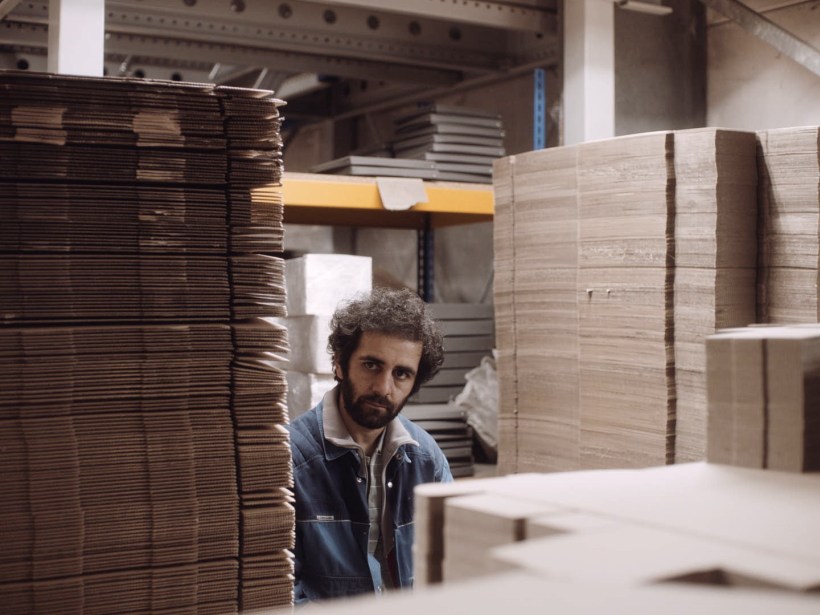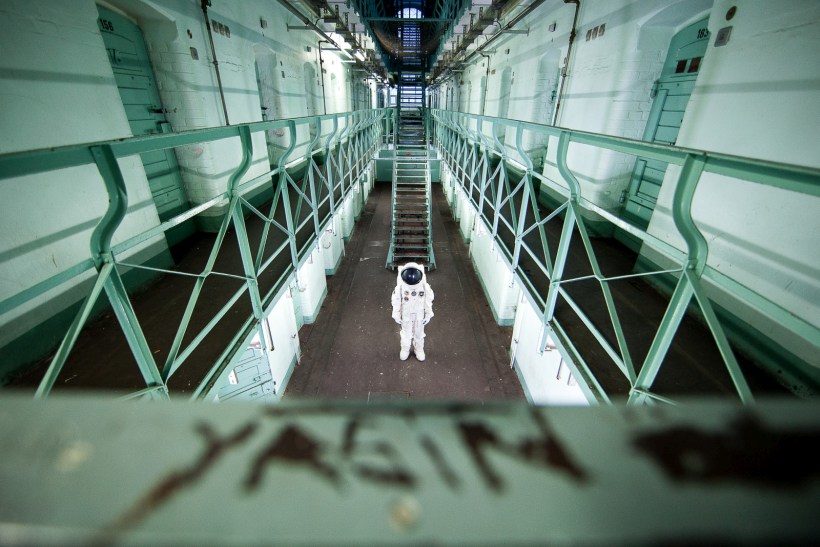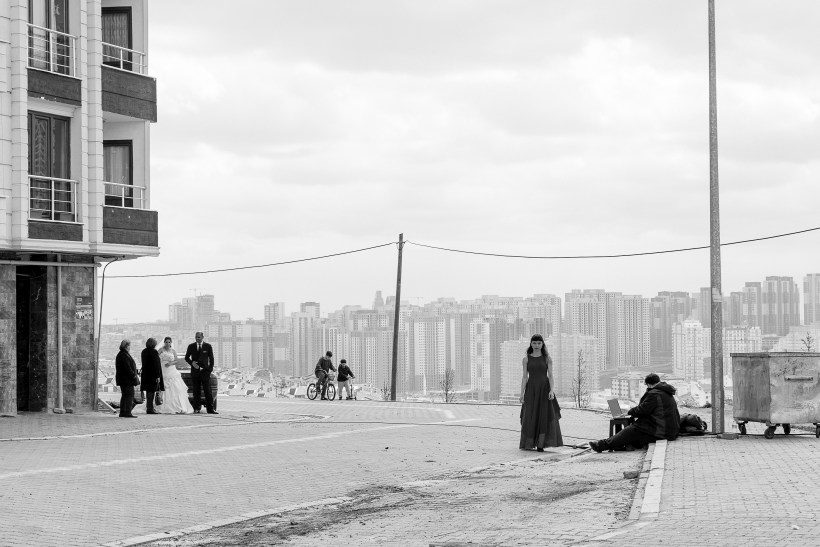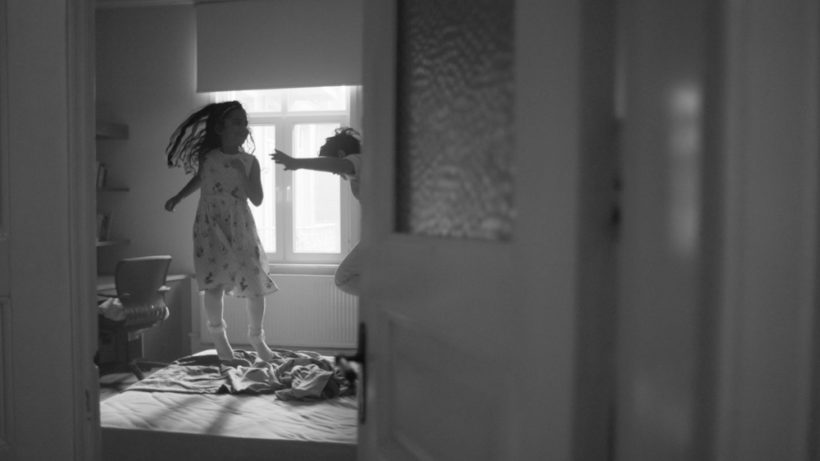The Scenic in Documentary Format

PROLL! © Jakob Reinhardt
For his short film with the striking German title of PROLL!, the filmmaker Adrian Figueroa received the German Short Film Award in November 2021[1]: Consisting of a golden metal band set on a base and swirling upwards spiral-like, as tall perhaps as a bottle of champagne. Congratulations!
Adrian Figueroa comes from theatre. Having grown up in Frankfurt am Main, he took drama studies and applied theatre in England, gaining an education that was as theoretical as it was practical. The English theatrical tradition has, as he mentions in conversation, a powerfully author and thespian basis. It frequently focuses on community theatre, through which it legitimises its social claims anew time and again. Theatre is the generator of a collective space, he explains, rather than a cathartic catapult; it is a place where the world becomes enlarged in all its complexity.
Figueroa is part of the Akademie der Autodidakten network in Berlin, the sensational lab for post-migrant culture that was founded in 2007 at the Ballhaus Naunynstrasse venue and has established impressive standards for cultural education since then. With Theresa Henning, Figueroa was the ‘gamemaster’ for the theatre play ONE DAY I WENT TO *IDL (2016), which is based on the song of the same name by the rapper Afrikan Boy, originally Ojushola Ajose from Nigeria. Most of the 13 (co-)actors aged between 21 and 29 had themselves had experience of fleeing. For Afrikan Boy, it seemed self-evident to perform the song “in 3D” for the theatre piece.
The next piece entitled STRESS (2017) was based on interviews with prisoners from a young offenders’ prison in Berlin. Its dramatization was undertaken by Figueroa and the dramatic advisor, curator and writer Tunçay Kulaoğlu. Taking the figure of the hooligan from the play HOOL (staged in 2018 at the Junges DT/Deutsches Theater youth theatre and based on the novel by Philipp Winkler), Figueroa developed eight differing performing characters. Doing so, he set less store on adrenaline, aiming instead for quiet monologues and moments of silence, as one critic described it[2].
Although he never attended film school, Figueroa came via documentary theatre to film. His first filmic work, an accompanying documentation, was dedicated to the play entitled DIE LÜCKE (2015)[3] from the theatre and film director Nuran David Calis. The play deals with the nail bomb attack in Cologne’s Keupstrasse by the German NSU (National Socialist Underground) neo-Nazi right-wing terrorist group in June 2006. Via portraits and onstage discussions, the relatives of those murdered by the NSU, who had been almost completely ignored by the main media outlets, regain their autonomous voices.
In his theatrical productions, over time Figueroa has experimented increasingly with audio-visual media and projections, while exploring the possibilities provided by medial superimpositions and overlays. He often works together with Tunçay Kulaoğlu, as indeed with his brother Philipp Figueroa and the musician Miguel Toro. AURORA, a theatre play about a complicated web of drug users and co-dependents, the helpers who helplessly support them and their equally entrapped therapists, premiered in 2019 at the HAU Hebbel am Ufer theatre. Utilising projected video-dropout stripes, as well as cubes and cells placed over each other, together with shifting spatial proportions, he created a disconcertingly attractive hallucinatory space. The interweaving of time-based media with what was occurring onstage became broadened and amplified both psychedelically and excessively in a unique manner.

ANDERSWO © Graz Diez
ANDERSWO/ELSEWHERE (2017), the first film made by Figueroa in a more self-contained form, was developed from his many years of experience with theatre projects in prisons. It focuses on five inmates in the JVA Tegel prison in Berlin, who do not want to be typified by their misdeeds. At the start, the film reveals the inmates shot in a portrait framing against a bright background. The light is glaring and the image remains unchanged for so long such that the view becomes capable of being inverted, with the people being filmed having time to calmly look at us in our audience face. Only now do they speak, first off-screen and then later on-screen as well. In this way right from the beginning, the reception of reality is propelled into a kind of retarding loop. The film presents enactments of wishful images from the incarcerated heroes: As an astronaut in the cell block, relaxing with shisha and a frilled shirt in a setting sun, wearing a balaclava and doing a somersault backwards in an underground garage – consisting of tableaus that make the fictions of reality permeable. In the texts which were elaborated together, the focus is not on the crimes committed by the prisoners. Instead, they permit them the space to also recount invented stories without slipping into sensationalism, as Figueroa explains. Long tracking camera shots evoke the controlling watch over the rows of cells. The film was shot in a vacant prison wing at the Tegel Prison, where the window heights no longer conform to the prison administration regulations. In each case, the participants ‘outfitted their own cells’ and agreed to have their portraits screened in the film.
At a showing of DIE LÜCKE in the Tarabya Cultural Academy in Istanbul, Figueroa got to know the civil rights activist and patron of the arts Osman Kavala, an impressive personality who is an advocate of civic cultural exchanges and continuous dialogue. On 1 November 2017, Kavala was arrested by the Turkish authorities. At that time, the political situation in Turkey was deteriorating significantly as a consequence of the attempted coup in 2016. The constitutional referendum in 2017 and the introduction of a presidential system were accompanied by increasing criminalisation of all forms of opposition. The influence of the executive authority on the judiciary escalated, and the state prosecutors accused Kavala of being behind the Gezi Park protests. In February 2020, Kavala was acquitted of these charges, but that same day he was charged with being involved in the 2016 attempted coup. Osman Kavala has now been held for more than four years in the Silivri high-security prison located to the west of Istanbul. It was opened in 2008 as the largest prison in Europe and more than 10,000 people are incarcerated there. With a photovoltaic system, solar panels, a hospital, staff of 500, a mosque, two high-security wings and several courtrooms. The Turkish journalist and filmmaker Can Dündar, who now lives in exile, has called it an internment camp.

LETTERS FROM SILIVRI © Graz Diez
The film LETTERS FROM SILIVRI (2020) was created collaboratively with the producer Çiğdem Mater and Tunçay Kulaoğlu acting as the dramatic advisor. In six 360-degree rotations on their own axis, the camera[4] captures in extreme slow motion – like with an imperceptibly changing spiral – the vastness of the urban space on the periphery of the big city. In the distance, high-rise buildings are stacked together in a densely constructed ring against the horizon. With building site cranes and newly planted small trees, cul-de-sacs and concrete plateaus characterising this area of urban transition. Esenyurt, the ‘booming suburb’ of Istanbul with a long history of immigrant communities, is now undergoing rapid gentrification. From the second of the six pans, the frame is filled with passers-by, local residents. A couple of men are sitting on footstools at the end of the street and chatting. Others are hoeing the arid ground. Children are playing, a bride and groom are standing before the backdrop of a new building, a couple of leaves are floating down from the sky. In the ever-intensifying animation, the urban landscape becomes increasingly over-built and spoilt. A pair of pigeons are flying in exalted sluggishness through the frame. Squatting on the horizon behind several modernist low-rise buildings is a huge mosque. Beside an excavator, a young woman is gyrating with her skirt swirling. The sounds of children at play. A young man aims an air gun up at the sky. Next to him, men are dancing with widely outstretched arms. Now the camera even turns upside-down and passes through billows of smoke or wafts of fog – or are they clouds of teargas? Extras stand still, frozen to the spot, others move in a kind of unreal slow-motion, like a group of happy children. On the soundtrack, private letters and official statements from Osman Kavala are quoted off-screen, chronicling the four years he has now spent in prison. The voiceover artist is the actor Mustafa Avkıran:
“Time goes by between reading, taking notes, walking, doing the laundry and cleaning. (…) Sixth month of my pre-trial detention in Silivri was completed on 1 May. We are waiting for the indictment. (…) Months of my lifetime wither away. I still have not been interrogated by the prosecutor. Requests for my release from prison have been rejected 19 times up to this point, without feeling any need for a court hearing in my presence.”
The final sentence is:
“I miss my home, I miss touching the earth, trees, plants.”
In another pan before the film ends, we see people gazing at the vast expanse of the city, a simple image of longing as an echo chamber for these tales of confinement. The voices and the images are fundamentally divided; the standstill and the slowed-down movements could be images for the physical constitution of a society under attack. In the meantime, the European Court of Human Rights has condemned the imprisonment of Osman Kavala and ordered his release. And although the Turkish constitution stipulates that this court ruling is binding, the head of state is not prepared to recognise it.
In 2019-2020, Adrian Figueroa originally planned a documentary theatre project about the labour-law based proliferation of ‘marginal employment’ for the HAU Hebbel am Ufer theatre in Berlin. The intention was to precede this with extensive research work. But the pandemic exacerbated the circumstances like under a magnifying glass, and already the first lockdown in 2020 put paid to his research.
Thus, the film PROLL! (2020) was made as a production of the HAU theatre. It starts like a crime thriller: Night-time, headlights shining on a dirt track, a car pulls to a stop, the driver and front passenger acting wordlessly, knowing what they have to do. In the blinding car lights, the driver approaches us, then drags an object, vaguely recognisable as a sheep, to the side of the road. They both get back into the car and drive away. This nebulous nocturnal activity is supercharged by the soundscape. The film title PROLL! appears in a garish yellow glare of objectified grotesque letting and with an exclamation mark[5].
A battle cry that blazes between the proletarian and the prole, between pride and defamation, a catchword that leads directly into the field of class issues. According to Adrian Figueroa, as a short form for prole or proletarian, the word also means an anachronistic conglomerate of numerous universalist assumptions. As they no longer apply to today’s work-oriented society as such anymore, this also consists especially of a film title that does not summarise appeasingly, but instead awakens frictions and potential contradictions.
Realistic sounds of work and everyday activities. The sale of a minibus with a not-too-reliable fanbelt. A woman asleep. A mobile phone alarm clock rings. The camera follows several work routines and reveals their working environments: With a female clickworker, a sub-sub-sub-contractor packet deliverer and the employees in a small cardboard factory due for closure. Blocks of flats, stairwells, storage facilities. Yet what the film conveys so palpably is the first-hand experience of the stress that seems to lodge in the human body with such precarious jobs; with trying to achieve a balance in daily life under such conditions that are already exploitive in the first place. An endless grind. Images of a herd of sheep at body height that appear unexpectedly on occasion reinforce this impression of subjection, without permitting it to become hijacked as a metaphor.
Based on the screenplay by Maike Wetzel, PROLL! was planned over a two-month period and meticulously prepared so that the editing time on the visual material amounted to just one and a half weeks. After that, the sound design was added.

DEAR OSMAN © Adrian Figueroa / Ersin Gök
A change in perspective: Figueroa’s most recently completed film DEAR OSMAN (2022) quotes from letters sent by relatives and supporters to Osman Kavala in prison, where he has now been incarcerated since November 2017. This time the camera floats in a smooth gimbal mode through an apartment, in which three generations live. Wafting curtains, with the light outside cast through the structure of their fabric. The car traffic outdoors growling mutely. A birdcage, a set of seats. We glance through a half-opened door where a man is sitting on an armchair and relaxing, across from him a whishing flatscreen. CD covers on a shelf, a goldfish bowl, a thick paperback about Hrant Dink[6], Nâzim Hikmet, the Armenian Genocide. In a room shrouded in darkness, a woman is sleeping on a mattress. Everyday scenes from the life of a middle-class family, trapped at the same time in a strange, aberrant stagnation.
“They know very well that keeping you there hurts all of us. But they don’t know that we will pour like rain, seething through the Silivri walls, Osman Bey[7], and whatever it takes, we’ll always reach you. (…) Neither can they take you from us, nor can they cease our dialogue.”
Adrian Figueroa himself speaks of the echo chambers and resonance spaces that he creates with his idiosyncratic cinematographic and theatrical arrangements and constructs. With an awareness for blind spots and realities, for protagonists and their precarious experiences often invisible to society, for borderline experiences – all of which shape his work. Time and again, he succeeds in achieving an expressive supercharging and scenic compression of multifarious realities researched and explored via the documentary.
[1]“Proll” is the abbreviated German for the English word “proletarian”, which is abbreviated to “prole” in slang English. In May 2021 PROLL! was awarded 1st Prize in the German Competition at the International Short Film Festival Oberhausen.
[2] https://daskulturblog.com/2018/12/18/hool-theater-kritik/ (in German only)
[3] The Gap
[4] A Phantom Flex model
[5] The letter colouring is a play on the yellow vests, while the modified Gothic typeface ‘with a Nazi background’ alternates between menace and irony.
[6] Hrant Dink was an Arminian with Turkish citizenship, who worked as a journalist and co-editor of the bilingual weekly newspaper Agos, published in Istanbul. The editor, who was subjected to hate campaigns orchestrated by nationalist forces in society and the justice system, was shot to death in the middle of the street in January 2007. His funeral procession was attended by 100,000 people.
[7] In the letters, Kavala is mainly addressed as ‘Sevgili Osman Bey’ – dear Osman Bey
Beitragsbild PROLL! © Jakob Reinhardt